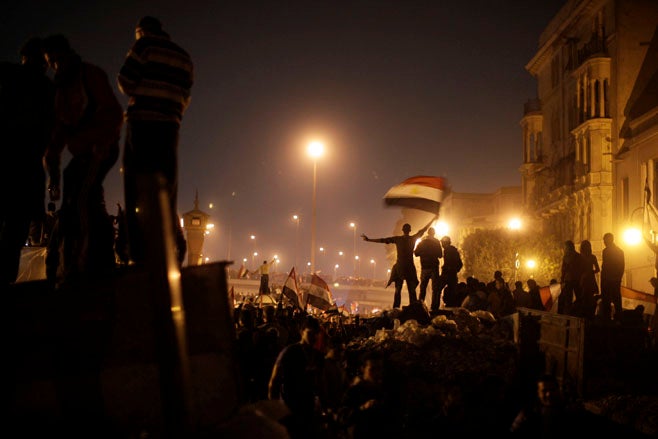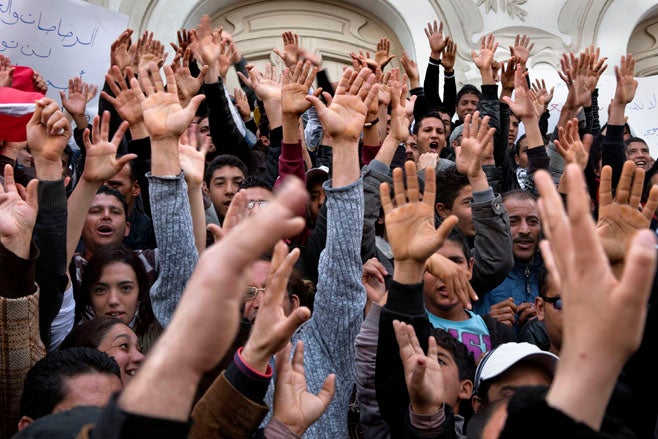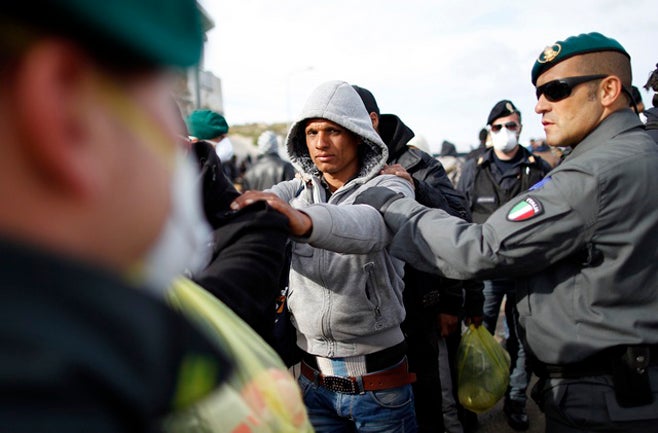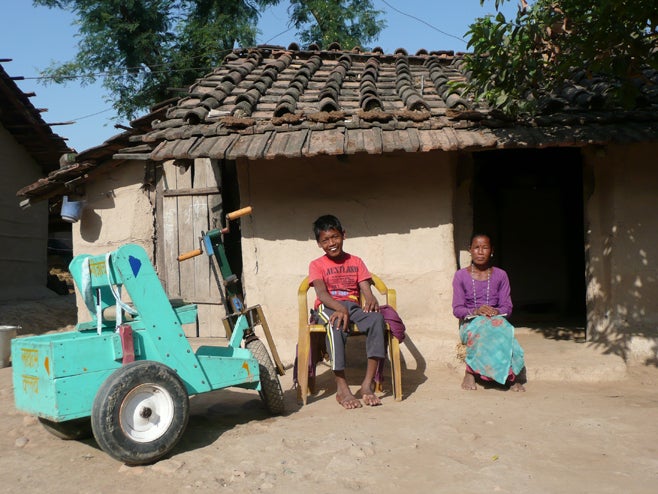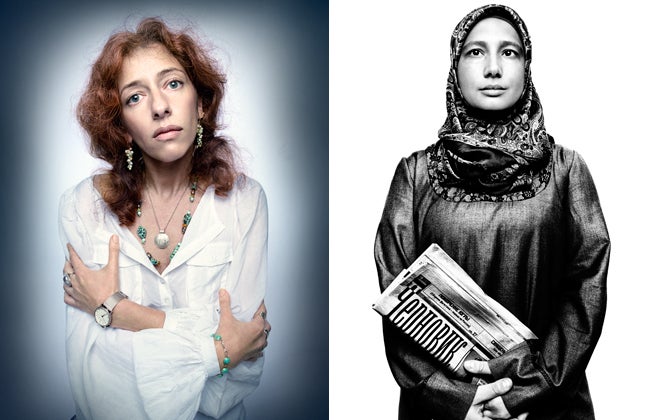More than three years after deadly street clashes between police and opposition protesters left 10 individuals dead, there has been no meaningful accountability for the excessive use of force by law enforcement. The government decriminalized libel, but drastically increased financial penalties in civil libel suits. Authorities continue to restrict freedom of assembly. Torture and ill-treatment in police custody persist and the government has failed to effectively investigate a troubling number of deaths in custody and non-combat deaths in the military.
Armenia’s international partners have not fully leveraged their influence to improve the human rights situation.
Lack of Accountability for Excessive Use of Force
In April 2011 President Serge Sargsyan ordered efforts to intensify investigations into the role of security forces in the March 1, 2008 clashes with opposition protestors in Yerevan, the capital, which resulted in the deaths of 10 people, including two police. Four officers were convicted in December 2009 but immediately amnestied. Under a May 2011 general amnesty all civilians remaining in custody on charges related to the clashes, including two prominent opposition politicians, Sasun Mikaelian and Nikol Pashinian, were released.
Freedom of Assembly
In April 2011, Yerevan officials allowed the opposition Armenian National Congress (ANC) to demonstrate in Freedom Square for the first time since the March 2008 clashes. However, opposition activists allege that the authorities prevented demonstrators from traveling from other cities to participate in subsequent large opposition rallies.
In October police arrested Vartgen Gaspari outside the prime minister’s office as he participated in a peaceful demonstration of a few dozen parents of military personnel and activists protesting the large number of military non-combatant deaths. Gaspari was charged with hooliganism and resisting police and released on bail two days later.
In December 2010 a court imposed a two-year suspended sentences on opposition activists Sargis Gevorgian and Davit Kiramijyan for hooliganism and assaulting police when police tried to prevent demonstrators from entering Freedom Square in March 2010.
Torture and Ill-Treatment
Local and international human rights organizations reported ill-treatment of detained persons in police custody. In August the Council of Europe’s Committee for the Prevention of Torture (CPT) made public the report on its 2010 visit, which documented a “significant number of credible and consistent allegations of physical ill-treatment of detained persons,” as well as torture of detainees, allegedly in order to secure confessions and other information.
In August police beat and detained seven ANC activists after they intervened in what they believed was an illegal police stop and search of another man in a Yerevan park. Medics diagnosed the activists with concussions. Police charged all seven with hooliganism and assaulting an official. A court remanded one activist, Tigran Arakelian, to four months of pre-trial detention. At this writing there had been no investigation into the police’s actions.
In June two plainclothes Yerevan police officers shot and killed robbery suspect Arman Yengibaryan. Police justified the use of force by saying Yengibaryan fired a gas pistol at police while fleeing. Local human rights groups contend police actions were excessive. Yengibaryan’s gun had no live ammunition and gunshot wounds to his head and abdomen suggest police did not try to minimize recourse to lethal force. An initial criminal investigation concluded the police actions were lawful, but Yengibaryan’s family is challenging that outcome on the basis that the investigation was not effective, as required by international law, and in particular because they, as the family of the deceased, had no access to the investigation.
Despite a May amnesty releasing 590 prisoners, prison overcrowding persists, leading to violations in detention conditions and standards of treatment, such as unhygienic conditions, inadequate medical care, and lack of exercise. Overcrowding is mainly due to courts improper overuse of pre-trial detentions.
Deaths in Custody
Unexplained deaths in custody also mar Armenia’s human rights record. In October 2010 Slavik Voskanyan died in pre-trial detention in Vanadzor two weeks after his detention on murder charges involving a police officer’s mother. According to his family, Voskanyan died from gangrene, which developed after a wound sustained in custody became infected and was not properly treated. A criminalinvestigation was closed after it concluded that the prison doctor's negligence was not responsible for Voskanyan's death. The investigation never examined how Voskanyan sustained the wounds that lead to his death.
In November 2010 a court convicted Ashot Harutyunyan, former head of the Charentsavan Police Investigative Department, to eight years for abuse of authority and incitement to suicide with respect to Vahan Khalafyan, who died from knife wounds in police custody in April 2010. Local human rights groups and Khalafyan’s family believe he was stabbed to death.
In May 2011 a court overturned prosecutors’ March 2011 decision to terminate the investigation into the 2007 death of Levon Gulyan. Officials claim Gulyan jumped from the second story of a police station while trying to escape. Gulyan's relatives insist he was tortured.
Army Abuses
Local human rights groups report ill-treatment, hazing, and an alarming number of non-combat deaths in the army. The Helsinki Citizens’ Assembly’s Vanadzor Office reported at least 17 non-combat deaths through October 2011. For example, Torgom Sarukhanyan, 21, died in February, allegedly of a self-inflicted gunshot. Ministry of Defense investigators arrested three servicemen on charges of incitement to suicide. Sarukhanyan’s family claims that he was murdered and that his body bore signs of beatings.
In December 2010 a court sentenced Maj. Sasun Galstyan to three years imprisonment for abuse of authority. A video of Galstyan beating and humiliating two conscripts appeared on YouTube in September 2010.
Freedom of Media
In May 2010 Armenia decriminalized libel. However, amendments to the civil code introduced high monetary fines for libel and defamation and led to an increase in lawsuits against newspapers, particularly by public officials. In some cases courts’ disproportionately large damage awards threaten the survival of newspapers. Journalists and editors report the chilling effect of large fines.
In February 2011 a court ordered the pro-opposition daily Haykakan Zhamanak to pay three government-connected businesspeople approximately US$16,500 in damages and retract allegations that they were implicated in criminal activities (the average monthly salary in Armenia is $90). The newspaper has sought donations from its readers to pay the fine and keep publishing.
In June a court ordered the opposition newspaper Zhamanak to pay former President Robert Kocharyan approximately $8,250 for having published allegations implicating him in corrupt business deals during and after his presidency, placing Zhamanak in serious financial straits. In another defamation suit brought by Kocharyan, a court in June froze the daily newspaper Hraparak’s bank accounts pending a verdict.
In a separate case, in September a Yerevan court froze approximately $8,000 of Hraparak’s assets and prohibitedthenewspaperfrom writing about a libel lawsuit filed against the paper by the head of the state body responsible for judicial supervision.
In February a court ordered the daily Yerkir to pay approximately $800 to pro-government parliamentarian Tigran Arzakantsyan in a spurious suit after the newspaper called Arzakantsyan a “dandy” in an article.
Lack of media pluralism remains a problem. In December 2010 the National Commission on Television and Radio, responsible for broadcasting licenses, denied independent television station A1+ a license for the 13th time, despite a 2008 European Court of Human Rights (ECtHR) judgment that Armenia had violated freedom of expression by repeatedly and arbitrarily denying the station a license.
The authorities also refused to grant digital broadcast licenses to ALM television, whose owner has expressed political ambitions, and to the Gyumri-based GALA TV, although GALA can broadcast on analogue frequencies until 2015 with its existing license. Since 2007 GALA has been subject to apparently politically motivated court cases and harassment by state agencies, seemingly in retaliation for the station's coverage of opposition party activities.
Human Rights Defenders
In August a court heard a defamation suit Lernapat Mayor Vano Yeghiazaryan filed against Artur Sakunts, head of Helsinki Citizens’ Assembly’s Vanadzor Office, after Sakunts accused Yeghiazaryan in a newspaper interview of embezzlement and abuse of power, and criticized the authorities’ unwillingness to investigate the allegations. The trial is ongoing.
Key International Actors
Several of Armenia's international partners limited their criticism of the government’s human rights record.
In its May European Neighborhood Policy progress report, the European Union highlighted Armenia's lack of judicial independence, limited media pluralism, poor prison conditions, and inadequate investigations into ill-treatment, but stopped short of articulating concrete human rights improvements required as part of its engagement with Armenia’s government.
In an October 2011 resolution on Armenia’s fulfillment of its obligations as a Council of Europe member, the organization’s Parliamentary Assembly gave the government undue credit by stating, “the chapter on the March 2008 events can finally be considered closed.” The resolution nevertheless reiterated concerns about the lack of accountability for the 10 deaths during the clashes.
In a May report on Armenia, Thomas Hammarberg, Council of Europe commissioner for human rights, focused on freedom of expression, assembly, and association, and abuses in the army. He urged the authorities hold accountable those responsible for excessive use of force in the March 2008 clashes.
In its April concluding observations, the United Nations Committee on the Elimination of Racial Discrimination urged the authorities to, among other things, do more to combat manifestations of discrimination against individuals and groups.
